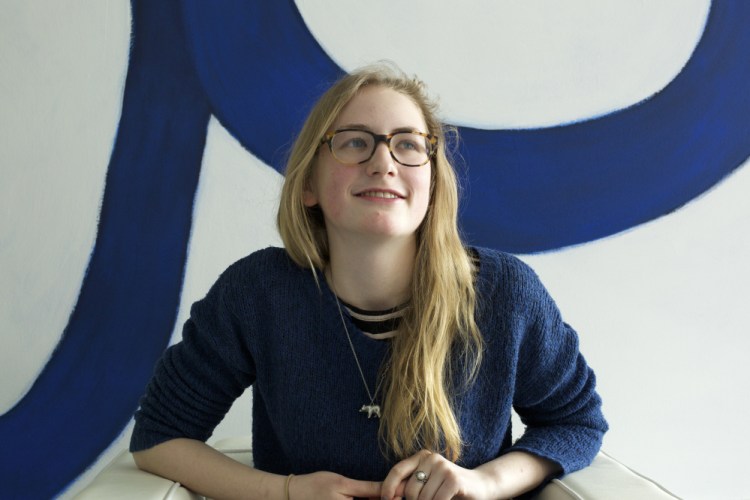Constellations are our way of linking stars so that they become something familiar, so that we can view them as images and use them as metaphor. Constellations are to stars what poems are to words. Esther Mathieu, in “Constellations,” her debut collection of poetry, builds staircases of words that lead back and forth between earth and sky, exploring both, and a life in the space between the two.
Mathieu is a student at Colby College, graduating in 2017. She was raised in Queens, and her poems skip between the urban landscape of her home and the distinctive features of Maine – “long evening archipelagos” and “The moon…/shining in airborne water…” Or, at least this reader imagines Maine.
This is a theme in Mathieu’s collection: two distinct places, ideas, words, getting linked and growing together, becoming something new. There is New York and Maine, bridged by Mathieu herself. There is the sea and the sky: “What is the sea but one more greatness of heaven?/What are we but wondering and wandering/between these two majesties, unknowing/always?” There is rootlessness and blooming, love and weariness, fear and attraction: “I fear oblivion like a snail fears salt/but all the same it’s something I could sink into.”
And then there are her hyphens, liberally used to create hyper-modifiers. There are “ankle-deep boundaries,” “far-off glowings” and “ought-to-bes.” In just one poem, “Beachbound Yearning of Hero and Sea,” she writes about “many half-utterances,” “half-formations of fluttered motion,” “half-dreamed spires,” and “half-squalid near-histories half-remembered.” With her arrangement of both words and ideas, Mathieu explores the tension and creativity present in dualities.

She notices all of the places where the whole becomes pieces and pays particular attention to the different kinds of separateness and connection: grafted, “breaking into fractures and fragments,” stitched, seams, “edges creased and torn.”
She writes, “and if the wind can pick up pieces of me so joyfully/I may as well let it take the ones I don’t want.”
Mathieu plays with words, looking for homographs and homophones. They create levity amidst serious, sometimes dark subjects. In the acknowledgments, Mathieu thanks family, friends and teachers. She also names her gratitude for her therapist, psychiatrist and school counselor. She is obviously attentive to the life of the mind, to connection and to loneliness.
In an interview with “Yes, Poetry,” she said, “I am also obsessed with finding ways to articulate the truth about living as a young person with mental health issues today – trying to find the ways to say what it feels like inside of depression and anxiety, trying to tell other people, but also trying to tell myself.”
Mathieu does tell us this, but also more. She has created small but intricate worlds within each poem that, when connected, become patterns of truth. In “Dreaming” Mathieu describes exactly what she has created with this first collection: “I want to have hands/that smell like bread dough and ink from all the things I’ve made/…and use my hands to craft small eternities.”
Heidi Sistare is a writer and social worker who lives in Portland. She attended the Salt Institute for Documentary Studies and has been published in The Rumpus, Slice Magazine and other publications. She can be contacted at:
heidi.sistare@gmail.com
Twitter: heidisistare
Send questions/comments to the editors.



Success. Please wait for the page to reload. If the page does not reload within 5 seconds, please refresh the page.
Enter your email and password to access comments.
Hi, to comment on stories you must . This profile is in addition to your subscription and website login.
Already have a commenting profile? .
Invalid username/password.
Please check your email to confirm and complete your registration.
Only subscribers are eligible to post comments. Please subscribe or login first for digital access. Here’s why.
Use the form below to reset your password. When you've submitted your account email, we will send an email with a reset code.